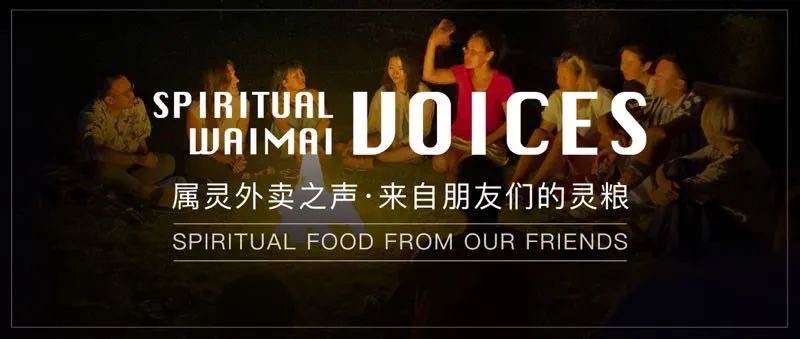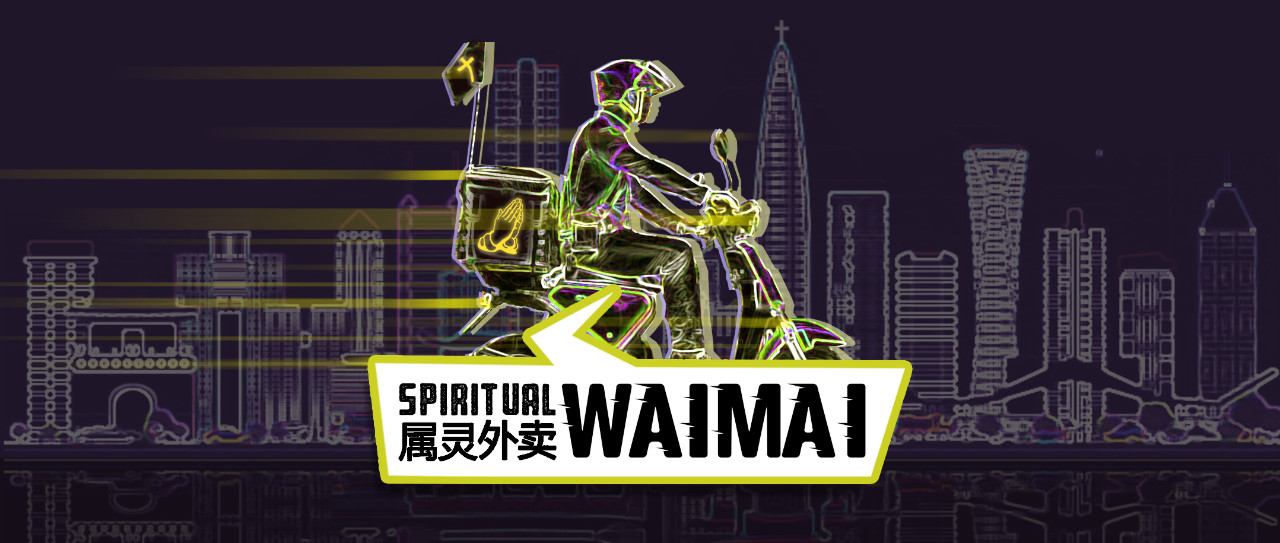This article is a part of a series called “Spiritual Waimai Voices” where we welcome our friends to share some spiritual food with us in their own voice. This Spiritual Waimai was written and recorded by our friend Luke.
本文是《属灵外卖之声》系列文章之一,该系列里我们欢迎朋友们用自己的声音来分享灵粮。这篇属灵外卖的写作来自我们的朋友Luke.
中文和英文版本语音
Listen to the Chinese or English Audio
_
Now Mary stood outside the tomb crying. As she wept, she bent over to look into the tomb and saw two angels in white, seated where Jesus’ body had been, one at the head and the other at the foot. They asked her, “Woman, why are you crying?” “They have taken my Lord away,” she said, “and I don’t know where they have put him.” At this, she turned around and saw Jesus standing there, but she did not realize that it was Jesus. He asked her, “Woman, why are you crying? Who is it you are looking for?” Thinking he was the gardener, she said, “Sir, if you have carried him away, tell me where you have put him, and I will get him.” Jesus said to her, “Mary.” She turned toward him and cried out in Aramaic, “Rabboni!” (which means “Teacher”). Jesus said, “Do not hold on to me, for I have not yet ascended to the Father. Go instead to my brothers and tell them, ‘I am ascending to my Father and your Father, to my God and your God.’ ” Mary Magdalene went to the disciples with the news: “I have seen the Lord!” And she told them that he had said these things to her.
John 20:11-18 NIV.马利亚却站在坟墓外面哭。哭的时候,低头往坟墓里看,就见两个天使,穿着白衣,在安放Ye Su身体的地方坐着,一个在头,一个在脚。天使对她说:“妇人,你为什么哭?”她说:“因为有人把我主挪了去,我不知道放在哪里。”说了这话,就转过身来,看见Ye Su站在那里,却不知道是Ye Su。Ye Su问她说:“妇人,为什么哭?你找谁呢?”马利亚以为是看园的,就对他说:“先生,若是你把他移了去,请告诉我,你把他放在哪里,我便去取他。”Ye Su说:“马利亚。”马利亚就转过来,用希伯来话对他说:“拉波尼。”(拉波尼就是夫子的意思)Ye Su说:“不要摸我,因为我还没有升上去见我的父。你往我弟兄那里去,告诉他们说,我要升上去见我的父,也是你们的父,见我的Shen,也是你们的Shen。”抹大拉的马利亚就去告诉门徒说:“我已经看见了主。”她又将主对她说的这话告诉他们。 约翰福音 20:11-18
To understand the complexity of this passage, you first have to understand the culture in which it takes place. Traditional Jewish culture has many similarities to Chinese culture. Among them is the idea of Zhongnanqingnv. By Jewish law, woman’s testimony was not considered valid unless she was vouched for by a man.
要了解这段经文的复杂性,你首先必须了解它当时的文化。传统犹太文化与中国文化有许多相似之处。其中就有“重男轻女”的思想。根据犹太人的律法,女性的证词除非得到了男人的担保,否则不会被认为是有效的。
So when Jesus chooses this solitary woman to be the first witness of his resurrection, the implications are huge. The story actually supports the truth of scripture because this fact would have been so embarrassing to the early church—the only reason to include it would be because it was true. And yet, Jesus still chose Mary Madeline to be his first witness. In doing this, Jesus began a paradigm shift in which the words of women as well as those of men were considered valuable.
所以,当Ye Su选择这位孤独的女人作为祂复活的第一个见证人时,其影响是巨大的。这个故事实际上支持了Sheng Jing的真理,因为这个事实会让早期的教会非常尴尬——唯一的理由就是它是真实的。然而,Ye Su仍然选择让抹大拉的马利亚来做衪的第一位见证人。在这样的过程中,Ye Su开始了一种样式的转变,女性的话语和男性的话语一样被认为是有价值的。
Why Mary? We don’t know. There are a few things we know for certain about Mary from the scriptural record. We know that she was an eye-witness to the crucifixion, we know that she was in the garden that morning to anoint Jesus’ body, and we know that Jesus freed her from demon possession. Beyond this, we are not really certain. Some people believe that she was the woman who was supposed to be stoned for adultery. Some associate her with the “sinful woman” who anointed Jesus in the house of Simon the Pharisee. The Gnostic gospels even suggest that she was Jesus’ wife, though those documents have been rejected by the church. Honestly, we really don’t know why Jesus chose Mary to be the first witness to his resurrection; we just know that he did.
为什么是马利亚?我们不得而知。从Sheng Jing的记载中,我们可以确定关于马利亚的一些事情。我们知道她亲眼看见Ye Su被钉在十字架上,我们知道她那天早上在花园里膏Ye Su的身体,我们也知道Ye Su把她从鬼附中解救出来。除此之外,我们并不太确定。有些人认为她就是那个因通奸本该被石头砸死的女人。有些人把她与“有罪的女人”联系在一起,就是在法利赛人西门的家里为Ye Su抹油的。诺斯替教派的福音甚至暗示她是Ye Su的妻子,尽管这些文件被教会否绝。老实说,我们真的不知道为什么Ye Su选择马利亚作为祂复活的第一个见证人;我们只知道祂确实这样做了。
The passage strikes me as odd that two angels would be hanging out in the empty tomb just to ask Mary why she was crying, but apparently, that’s what they were doing—and she had to be crying pretty hard because even when she saw Jesus, she mistook him for the gardener. I suppose she was right in a way. The Fall of humanity began in a garden, and it was in a garden that the story was set right. Death began in the Garden of Eden, but it was defeated when the Gardener came back to life. But Mary wasn’t thinking about that. She responds to Jesus’ question with an almost fierce determination: Sir, if you have carried him away, tell me where you have put him, and I will get him.
这段话让我感到很奇怪,两个天使显现在空坟墓里,只是为了问马利亚为什么哭,但显然,他们就是这么做的,她肯定哭得非常伤心,因为即使当她看到Ye Su时,她也把祂误认为是园丁。我想她在某种程度上是对的。人类的堕落始于一座花园,正是在一座花园里,故事才得以纠正。死亡始于伊甸园,但当园丁复活时,它被打败了。但马利亚并没有考虑到这一点。 她以近乎激烈的决心回答Ye Su的问题:先生,若是你把祂移了去,请告诉我,你把祂放在哪里,我便去取祂。
Jesus replies with a single word—her name. “Mary.” Can you imagine the feeling she must have had when that word hit her ears? In a way that only Jesus could say it? How many emotions would she experience at the same time? Shock. Confusion. Joy. More confusion. More joy. We don’t know what she did, but Jesus replies, “Do not hold on to me, for I have not yet ascended to the Father.” In the visual Bible, she grabs his hand and then kind of lets it go limp, but I have my doubts on that. Compared with the intensity of her statement about going to get Jesus’ body herself, I’m picturing more of an American football chopping block tackle like my kids do to me when they don’t want me to go out the door. Like I said, we don’t know what she did, but Jesus’ message is clear: I’m not here to stay. Then he commissions Mary to go tell the disciples that he has risen from the dead and will be returning to the Father. In essence, he makes her the first missionary. He sends her to stir faith in the hearts of his discouraged followers.
Ye Su只回答了她的名字,“马利亚”。你能想象当她听到这个词时的那种感受吗?以一种只有Ye Su才能说出来的方式?她会同时经历多少种情绪?震惊。困惑。喜乐。更加困惑。更加喜乐。我们不知道她做了什么,但Ye Su回答说:“不要摸我,因为我还没有升上去见我的父。” 在视觉Sheng Jing这部电影中,她抓住了祂的手,然后慢慢地松开,但我对此表示怀疑。
她坚定地说要亲自去取Ye Su的身体,与此相比,我联想更多的是美式橄榄球比赛中的擒抱摔阻截铲球,就像我的孩子们不想让我出门时对我做的那样。就像我说的,我们不知道她做了什么,但Ye Su的信息很清楚:我不会留在这里。然后祂委托马利亚去告诉门徒,祂已经从死里复活,将要回到父那里。本质上,祂让她成为第一位传教士。祂派遣她去激起那些气馁的信徒们的信心。
So what can we learn from this story? I think it can be summed up into three parts. First, Jesus cares about women. More than any moral leader before or since, he tips the scale of zhongnanqingnv and chooses a woman’s testimony to be the first record of the resurrection. Men and women have different roles, but their value is the same in his sight. For all of the women who have struggled with your value because you were not born a boy, look at Mary Madelene and find your identity. Your voice and your value are no less important because you are a woman. You are not worthless. You do not need to prove yourself. You do not need to be a man. Be who you were made to be and bear witness that you have seen the Lord.
那么我们能从这个故事中学到什么呢?我认为它可以归纳为三个部分。首先,Ye Su关心女性。祂比之前或之后的任何道德领袖都更能倾斜重男轻女的天平,并选用一位女性的证词来最先记录复活。男性和女性有着不同的角色,但在祂看来,他们的价值是一样的。所有那些为自我价值做斗争只因不是男儿身的女性,请看看抹大拉的马利亚并找到自我。作为女性,你的声音和价值是同样重要的。你并不是没有价值的。你并不需要证明自己。你不需要像男人一样。做你被造时的样子,并为主作见证。
Second, it took the resurrection of the Gardener to undo the curse that began in Eden. Jesus’ sinless sacrifice overturned the sin of the first Adam, but his resurrection sets things right. Death has lost its power. We need no longer fear. Death is no longer the end of our story; it is a transition—the doorway to more life.
其次,园丁的复活解除了始于伊甸园的诅咒。Ye Su无罪的献祭推翻了第一个亚当的罪,祂的复活使事情回到正轨。死亡失去了它的力量。我们不再需要恐惧。死亡不再是我们故事的结局;它是一种转变——是通往更多生命的大门。
And finally, sometimes all it takes to change our world is for Jesus to say our name. In these difficult times, many people are alone. Many are fearful. Many are grieving. Our tears blind us to the reality that Jesus is not dead. He stands before us in all his glory, but we don’t recognize him. If you are disconnected, discouraged, or distressed today, know that it’s okay to ask for Jesus to say your name—to speak to you in a special way.
最后,有时候改变我们的世界只需要Ye Su呼唤我们的名字。在这些艰难的时刻,很多人都会感到孤独,恐惧和悲伤。 我们的眼泪使我们看不到Ye Su未死的事实。祂荣耀地站在我们面前,但我们却认不出祂。如果你今天感到孤寂、沮丧或痛苦,你要知道,可以让Ye Su呼唤你的名字——用一种特殊的方式和你说话。
When I was in college, I was going through a crisis of faith. I knew all the stories. I sang all the songs, but I didn’t know if it was real. In despair of soul, I came to God and asked, that if he was real, to speak to me. I didn’t get an answer right away, but I didn’t numb out. I didn’t go to other pleasures that would drown out his voice. I didn’t give up. And eventually, he did speak to me. It wasn’t an audible voice, but it I know it was him. What he said changed the direction of my life forever. After that moment, I knew I was not alone; I was cared for; I was loved. This confidence propelled me into a future I would never have been able to face if I had never heard his voice.
在我上大学的时候,我经历了一场信仰危机。我知道圣经里所有的故事。我唱过所有的敬拜歌曲,但我不知道那些是不是真实的。在灵魂的绝望中,我来到Shen面前,请求祂,如果祂真的存在,可以和我说话。我并没有马上就得到答案,但我没有麻木。我没有参与其他会淹没祂的声音的娱乐活动。我没有放弃。最后,祂确实和我说话了。虽然那声音听不见,但我知道是祂。祂的话永远改变了我人生的方向。从那一刻起,我知道我不是一个人;有人在关心着我;我是被爱的。这种信心把我推向了一个未来,如果没有听到祂的声音,我将永远无法面对这个未来。
If you need that kind of strength today, go to Jesus. Ask him to speak to you. But you must be willing to wait for the answer. I do not doubt that he will speak to you, that he is always speaking, but we are seldom quiet enough to hear him. We fill our lives with activity, with service, with pleasure, with WeChat—with anything—rather than enduring the silence within our own soul, but it is in that silence where we can hear the still small voice—that gentle whisper speaking our name and turning our tears into joy. As you pray, as you wait, read the Scriptures. Jesus is speaking, let his truth pierce your heart. You will never be the same.
如果你今天需要这样的力量,就去找Ye Su。请祂跟你说话。但你必须愿意等待答案。我毫不怀疑祂定会对你说话,祂一直在说,只是我们很少能安静下来听到祂的声音。我们用活动,用服侍,用快乐,用微信——用任何东西——来充实我们的生活,却无法忍受我们灵魂中的静默,但正是在这种静默中,我们能听到那微小的声音,那温柔的低语,呼唤着我们的名字,把我们的眼泪变成喜乐。在你祷告,等待,读经的时候,Ye Su在说话,让祂的真理穿透你的心。你将和以前不一样。









